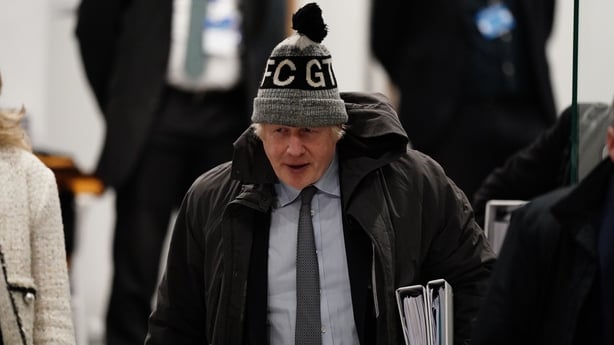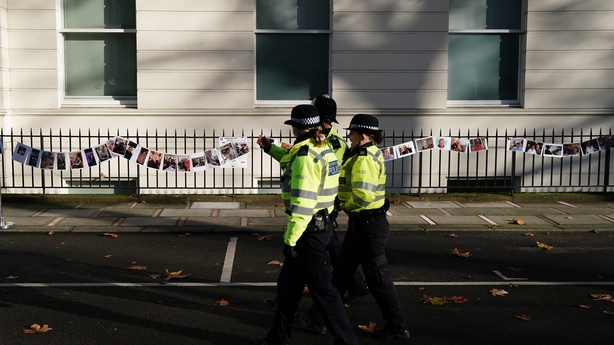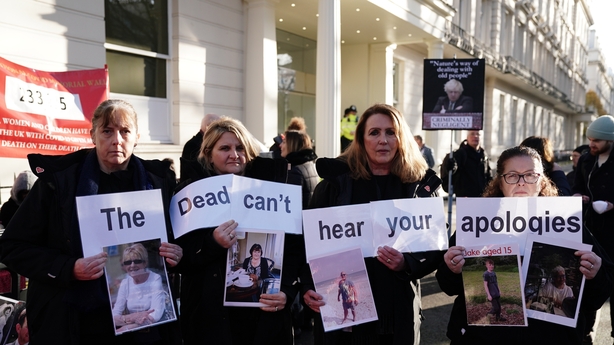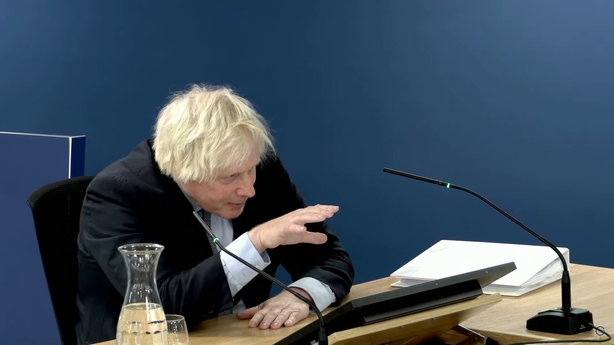Former British prime minister Boris Johnson has apologised for "the pain and the loss and the suffering" caused by Covid-19 but defended his government at a public inquiry into its handling of the crisis.
Mr Johnson, who has faced a barrage of criticism from ex-aides for alleged indecisiveness and lack of scientific understanding during the pandemic, completed the first of two days in the witness box.
He said that, at the start of 2020, the virus "wasn't really escalated to me as an issue of national concern" as the data emerging from China was misunderstood.
Ministers should have "twigged" about the need for action much sooner, Mr Johnson said, adding that it was only when he saw the "horrors" of the outbreak in Italy in February of that year that he realised the seriousness.
He suggested the experience of previous diseases, such as SARS, MERS and swine flu, clouded officials' judgement while a coronavirus pandemic was "outside our living experience".
The ex-leader - forced from office last year over lockdown-breaching parties held in Downing Street - accepted that "mistakes" had "unquestionably" been made but repeatedly insisted he and officials did their "level best".
"I understand the feeling of the victims and their families and I'm deeply sorry for the pain and the loss and the suffering to those victims and their families," Mr Johnson said.
"Inevitably we got some things wrong," he added, noting he took personal responsibility for all the decisions made. "At the time I felt ... we were doing our best in very difficult circumstances."
Mr Johnson arrived around three hours early for the proceedings, with some suggesting that he was eager to avoid relatives of Covid-19 victims, who gathered outside later in the morning.
As he started giving evidence, four women were evicted from the inquiry room after holding up signs stating "the dead can't hear your apologies".
"Can I just say how glad I am to be at this inquiry and how sorry I am for the pain and the loss and the suffering of the Covid victims," Mr Johnson responded.
Later, a crowd gathered outside the venue heckled loudly as he left for the day.

Nearly 130,000 people died with Covid-19 in the UK by mid-July 2021, one of the worst official per capita tolls among Western nations.
Mr Johnson, whose lengthy written submission to the inquiry will be published imminently, insisted his government's "overwhelming priority" had been protecting the state-run National Health Service (NHS) and saving lives.
Rejecting statistics that the UK fared worse than European neighbours, he argued that "every country struggled" with the outbreak while noting the UK is among the continent's most densely populated and had an "extremely elderly population".
Mr Johnson's grilling began with questions about failing to provide about 5,000 WhatsApp messages from late January 2020 to June 2020.
"I don't know the exact reason," he claimed, adding that the app had "somehow" automatically erased its chat history from that period.
Asked if he had initiated a so-called factory reset Mr Johnson said: "I don't remember any such thing".

Inquiry counsel Hugo Keith questioned the former prime minister about Downing Street chaos during the pandemic, and claims of general incompetence.
Mr Johnson's understanding of specialist advice was doubted last month by his former chief scientific officer, Patrick Vallance, who said he was frequently "bamboozled" by data.
His former top aide Dominic Cummings and communications chief Lee Cain both criticised their ex-boss when they gave evidence at the inquiry.
"What all those comments reflect is the deep anxiety of a group of people doing their level best who cannot see an easy solution and are naturally self-critical and critical of others," Mr Johnson insisted.

He denied going on a "long" holiday in February 2020, after coming under fire for taking a half-term break when the virus had exploded in Italy and there were cases in the UK.
Mr Johnson insisted that he was "working throughout the period" after it previously emerged there was a ten-day period in which no notes on coronavirus were sent to him nor emergency government meetings held.
He also defended keeping former health secretary Matt Hancock in his post, despite calls from his Mr Cummings that he should have been sacked.
Mr Johson said that Mr Hancock "may have had defects" but "I thought that he was doing his best in very difficult circumstances and I thought he was a good communicator".

Mr Keith quizzed the former leader about everything from shaking hospital patients' hands in early March 2020 to delaying the UK's first lockdown for weeks.
"I shouldn't have done that, in retrospect, and I should have been more precautionary," he conceded of the handshakes, adding that he should also have stopped sports events sooner.
Mr Johnson said that the eventual 23 March 2020 lockdown in England stemmed from "the sudden appreciation" that the virus was more rampant in the UK than previously thought.
"We were clearly wrong in our estimation of where the peak was going to be," he said.
"Once we decided to act, I think it was pretty fast from flash to bang."
Mr Johnson noted that Prime Minister Rishi Sunak, then finance minister, had raised concerns related to "a risk to the UK bond markets and our ability to raise sovereign debt".
But he said he gave "short shrift" to arguments that lockdowns were too extreme.
"I had no other tool - literally nothing else," Mr Johnson added, noting that "I couldn't take the gamble with public health".
Mr Sunak will face the inquiry in the coming weeks.
Read more:
Key points: Boris Johnson's evidence to Covid inquiry
Bereaved families appeared unimpressed by Mr Johnson's apology.
"We've had nearly four years now of rule-breaking, partying, making the wrong decisions," Kathryn Butcher, 59, whose sister-in-law died of Covid-19 said.
"His apology is meaningless."
Additional reporting PA

